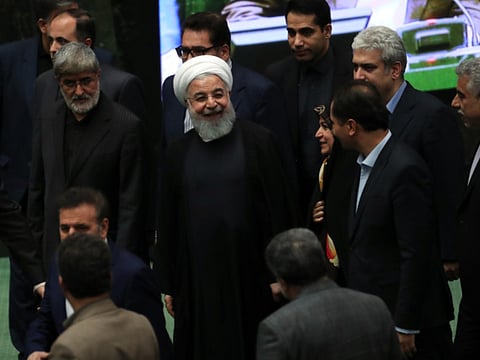Iran is the architect of its own downfall
Tehran has to change its behaviour by withdrawing from Syria, cutting ties with Hezbollah, persuading Al Houthis to give up weapons and ceasing hostilities

Yesterday, the Trump administration reimposed sanctions on Iran’s oil, gas, shipping and banking industries with more on the way. EU states have announced their displeasure while vowing to circumvent existing financial channels “allowing European exporters and importers to pursue legitimate trade”. Iran is demanding European guarantees of business as usual. Theirs is a faint hope. Few international corporations will risk defying Washington’s diktats.
The EU defends its position insisting that Iran has abided by the terms of the JCPOA (Joint Comprehensive Plan of Action) nuclear deal, which, confirmed by the IAEA (International Atomic Energy Agency) nuclear watchdog, is not in dispute. The renewal of US sanctions is designed to rein in Iran’s naked hostility towards its neighbours and to curb its ambitions to dominate Arab states via armed proxies.
However, rather than seek to change its aggressive ways, the head of the Revolutionary Guard Corps Mohammad Ali Jafari responded to sanctions on its oil exports with threats to close the vital Straits of Hormuz to shipping. “We will make the enemy understand that either everyone can use the Strait of Hormuz or no one,” he said. That statement has been largely written off as hot air because implementation of that threat would result in a major conflict.
It wasn’t so long ago Iranian officials boasted of controlling three Arab capitals — Beirut, Baghdad and Damascus — while feeling confident the Yemeni capital Sana’a was in the bag. Indeed, the ayatollahs carry the responsibility for the suffering of the Yemeni people. If Iran hadn’t funded and armed the Al Houthi militias which attempted to overthrow the elected government led by President Abd Rabbo Mansour Hadi, the ongoing war would have been avoided.
It is slanderous that the Western media invariably heap blame for Yemen’s misfortunes on the Saudi-led coalition that with US support and backing was forced to defend the kingdom’s sovereignty from cross-border infiltrations. Last year, Iran’s defence minister threatened to destroy Saudi Arabia with the exception of Makkah and Madinah.
Iran has long made false territorial claims on Bahrain and was the driver behind a Shiite uprising. In 2016, the Commander of the elite Revolutionary Guards Al Quds Force General Qasem Sulaimani threatened to fuel “a bloody intifada” in response to Bahrain’s revoking the citizenship of a Shiite cleric.
Moreover, Lebanon has been bleeding from the Iranian boot wielded by Hezbollah that has been branded a terrorist organisation by the US, Gulf states and other countries. It has branded itself as the protector of Lebanon whereas its actions have placed this tiny multi-religious country in the crossfire for decades and starved the government of not only foreign investment and aid but also effective government. Hezbollah’s demands block the appointments of presidents that aren’t in its camp as well as the formation of governments which is the case today.
Hezbollah’s leaders may be Lebanese nationals on paper but their loyalty and their pocket books are firmly rooted in Qum, home to Iran’s most influential clerics. Hezbollah, partnered with Iranian Revolutionary Guards and other Shiite militias, helped tip the balance in the Syrian regime’s favour on the ground without a thought for the potential implications for Lebanon that could so easily have been embroiled.
The Iranian regime needs to quit whipping up sectors of its population with fiery rhetoric against western countries and Saudi Arabia. It needs to reach out to its adversaries with an offer to be part of the solution, not the instigator of so many problems. A sea change in behaviour would be the greatest confidence-builder. A good start would be for Iran and Hezbollah to withdraw from Syria. Tehran should cut all ties with Hezbollah and use its leverage on Al Houthis to give up their weapons and declare a permanent cessation of hostilities.
The reimposition of US sanctions, especially on energy exports, will definitely hurt but without cooperation from Russia, China and the EU they are unlikely to deliver the desired result. Ultimately, the ball is in the regime’s court. It must weigh economic struggle and isolation versus good neighbourliness and inclusion within the community of nations. If Iran’s leadership cared about the welfare of its people, that should be a no-brainer.
Linda S. Heard is an award-winning British political columnist and guest television commentator with a focus on the Middle East.



